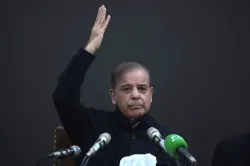Pakistan: Shehbaz Sharif elected Prime Minister three weeks after uncertain national elections
Sharif returned to the role he held until August when parliament was dissolved ahead of the elections and a caretaker government took over.

Islamabad: PML-N President Shehbaz Sharif has been elected the 24th prime minister of Pakistan after securing 201 votes, National Assembly Speaker Sardar Ayaz Sadiq announced, Dawn reported. Omer Ayub Khan, the PTI’s candidate for the premier, secured 92 votes.
Shehbaz extends gratitude to his brother Nawaz
"When my Quaid (leader Nawaz) was elected the prime minister thrice, the development that followed in the country is an example of its own. And it is not wrong to say that Nawaz Sharif is the one who built Pakistan,” Shehbaz said in his victory speech. "There are talented people sitting in this Parliament who can steer Pakistan’s ship to the shore […] these include journalists, intellectuals, politicians, religious leaders,” he said.
Voters in Pakistan went to the polls on Feb. 8 in an election marred by a mobile internet shutdown, arrests and violence in its build-up and unusually delayed results, leading to accusations that the vote was rigged.
Sharif returned to the role he held until August when parliament was dissolved ahead of the elections and a caretaker government took over. The vote in parliament, which first met on Thursday, took place amidst tight security as candidates backed by former jailed premier Imran Khan have protested against the result and called for his release.
The Sunni Ittehad Council (SIC) party backed by Khan alleges that the national election was rigged against them and has called for an audit of the polls. No single party won a majority.
Who is Shehbaz Sharif?
Sharif, 72, is the younger brother of three-time Prime Minister Nawaz Sharif, who spearheaded their Pakistan Muslim League-Nawaz (PML-N) party's election campaign. Candidates backed by Khan gained the most seats but the PML-N and the Pakistan Peoples Party (PPP) agreed to form a coalition government, which enabled Shehbaz Sharif to be elected as prime minister as his brother stepped aside.
In his previous term, Sharif's government was able to negotiate a critical International Monetary Fund (IMF) deal but the process was mired in challenges, and measures required by the agreement - which expires in April - have contributed to rising prices and added pressure on poor and middle-class households.
Shehbaz Sharif’s first tenure as Prime Minister
Before his stint as prime minister, the younger Sharif was known more as a good administrator than a politician, having served as chief minister thrice in the country's largest province, Punjab. But as prime minister, he quickly took on the role of peacemaker between coalition parties often at odds with one another over key policies. However, under his government, inflation touched a high of 38% with a record depreciation of the rupee currency, mainly due to structural reforms necessitated by the IMF programme to stabilise the country’s economy. He blamed the economic meltdown on his predecessor Imran Khan's government, which he says broke an agreement with the IMF just before he was ousted. He said his government had to introduce a slew of reforms and scrap subsidies, causing inflation to surge.
‘Can-do’ attitude
Sharif, who was born in Lahore to a wealthy Kashmiri-origin family that was in the steel business, started his political career as the Punjab’s Chief Minister in 1997 with a signature “can-do” administrative style. His cabinet members and bureaucrats who have worked closely with him call him a workaholic. As chief minister, he planned and executed a number of ambitious infrastructure mega-projects, including Pakistan's first modern mass transport system in Lahore.
He was caught up in the national political upheaval when his brother was ousted from the premiership by a military coup in 1999 and he went into exile in Saudi Arabia. Shehbaz Sharif entered the national political scene when he became the chief of the PML-N after Nawaz Sharif was found guilty in 2017 on charges of concealing assets related to the Panama Papers revelations.
Married twice, Shehbaz Sharif has two sons and two daughters from his first marriage but none from the second. One of the sons is in politics but the others are not in public life.
The path will be not a 'bed of roses' for Sharif
Pakistan continues to be enmeshed in an economic crisis with inflation remaining high, hovering around 30%, and economic growth slowing to around 2%. Sharif will need to emulate his feat of securing a short-term IMF bailout with the current programme expiring next month and a new extended deal needed to keep Pakistan on a narrow path to recovery. But his main role will be to maintain ties with the military, which has directly or indirectly dominated Pakistan since independence. Unlike his elder brother, who has had a rocky relationship with the military in all his three terms, the younger Sharif is considered more acceptable and compliant by the generals, analysts say.
For several years, the military has denied it interferes in politics. But it has directly intervened to topple civilian governments three times, and no prime minister has finished a full five-year term since the country’s independence. Privatising some lumbering state giants, including the national airline, and securing foreign investment will also be key to ease the economic crisis. The Sharifs have close ties with rulers in Saudi Arabia and Qatar, which could help in securing investments in several projects Pakistan has lately showcased for sale.
Although defence and key foreign policy decisions are largely influenced by the military, Sharif will have to juggle relations with the U.S. and China, both major allies. He is also faced with dealing with fraying ties with three of Pakistan's four neighbours, India, Iran and Afghanistan.